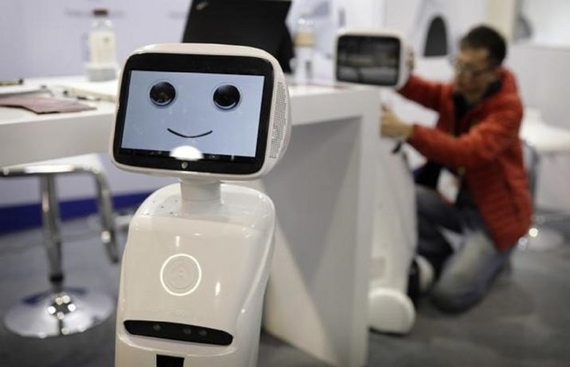Robots turn teachers in Bengaluru school

Disruptive technologies and Artificial Intelligence (AI) are making their way into classrooms as humanoid robots to teach students and interact with them as teachers do, at a school in Bengaluru.
"Our robots impart lessons daily in five subjects to about 300 students in Classes 7-9 in four sections by turns. They also interact with them and respond to questions in the subjects," Indus International School's Chief Design Officer, Vignesh Rao, told IANS here.
Though the 5 foot 7 inch robots, dressed in formal female attire, do not replace real teachers, they complement them in teaching lessons in the subjects and reply to FAQs (frequently asked questions) from students.
"We have programmed the interactive robots to answer questions students frequently ask on the subjects and related to them. With AI in play, the robots are able to respond to questions and doubts of our wards after a lesson is taught," said Rao.
The private international day-cum-boarding school has 25 co-ed students in each of the four sections for Classes 7-9. It is affiliated to the Geneva-based International Baccalaureate (IB) Institute and follows its syllabus, which is recognized worldwide.
"The AI-enabled robots teach lessons in Biology, Chemistry, Geography, History and Physics to Classes 7-9. As per the Collaborative Learning Model (CLM), the man-machine team, comprising a teacher, students and the robot, collaborate in the classroom to deliver a lesson. The teacher collaborates with the robot and brings out the key concepts, relevance and application of the lesson being taught," said Rao, who also heads the project.
Rao and his 17-member team have designed and built the three robots in-house from light-weight 3D-printed materials with imported smart servo motors. These robots emulate human-like gestures while delivering the lessons in the classroom.
"It has taken our team nearly two years to design and develop these robots with software, hardware and AI to make them teaching assistants and allowing the human teacher to be more relevant in the classroom so that they can focus on the child and not the subject alone," he added.
The team consists of teachers in the respective subjects - programmers, content developers, graphic designers and hardware engineers who built the mobile robots, weighing 45 kgs each.
Though the team did not rope-in any manufacturer to make the robots, it sourced hardware and software components from the best players in the industry to assemble them in-house at a cost of Rs eight lakh each.
"The response of students to a robot teaching them is positive and encouraging. They feel the collaboration between a human teacher and a robot enhances learning. It makes the human teacher focus on the child and personalise learning," Indus Trust Chief Executive Lt. General (retd) Arjun Ray told IANS.
Touted as the first-of-its-kind, the school plans to scale the pilot project to roll out more robots for other classes and more subjects in future.
The school is also in the process of applying for an international patent to protect the IP (intellectual property) of its Eagle 2.0 version humanoid robot.
"The CLM purpose is to make human teachers more creative in the education sector. Robots will not replace their human counterparts but will work collaboratively with teachers as a tool or assistant to enhance the learning experience for the students in the classroom," added Lt. General Ray.
Anvi Kurade, a Class 8 student in the school here, said it was fascinating to watch a robot taking classes and teaching lessons in as many as five subjects.
The Indus Trust has 14 educational institutions across the country, including three top-ranked K-12 international day-cum-boarding schools, eight early learning centres, Indus Training and Research Institute, Indus School of Leadership and Indus International Community Schools in Bengaluru and Belagavi in Karnataka, Chennai, Hyderabad and Pune.
About 4,000 students from 38 countries are enrolled in the Indus School and its branches, which have 520 teaching faculty.
Read more news:
Hilarious Paragliding Video Goes Viral on Social Media
Wipro, Google to Speed Up Digital Shift of Enterprises
